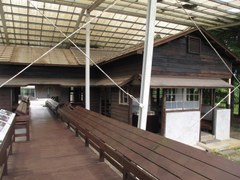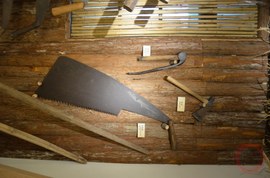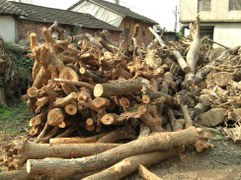Jiaobanshan Camphor Cultural Exhibition

Jiaobanshan Camphor Cultural Exhibition
Camphor Processing at Jiaobanshan
The camphor refinery at Jiaobanshan was the coarse production stage, whereas the camphor worker set up camphor huts near the camphor forests in the mountain and the workers held blades to shave camphor trees into thin slices, followed by distilling over a wok. The shaved camphor tree slices in 0.5~1cm thickness were placed into the wooden barrel for distillation. The camphor slices underwent high-temperature steaming to turn camphor and camphor oil into vapors, which were condensed through cooling devices and flowed into the separation tanks. The oil and water were separated using the principle of oil floating on the water surface due to smaller density of camphor oil than the water. There were two types of camphor produced in the mountain side, namely the coarse production (or mountain production) and the camphor oil.
Ubiquitous Camphor
The early purpose of camphor was used in medicine and produced as insect-repellent or condiments in life. The Celluloid Nitrate in 1869 and the smokeless powder invention in 1884 all used camphor as the key ingredient. In particular, 75% of the production materials for Celluloid Nitrate consisted of camphor. In 1989, Kodak used celluloid nitrate to produce soft films, which indirectly transform camphor produced from Taiwan to the key pushing hands for movie industries worldwide.
Camphor Refinery
The refinery process of camphor is divided into coarse production, re-production and refined production stages.
Coarse Production: It is also known as the "field production" where the camphor production was carried out in the field by shaving camphor trees into thin slices for distillation, followed by coarse production into camphor oil and camphor balls.
Re-production: The coarsely produced camphor balls and camphor oil were transported to Taipei camphor factory for continuous distillation in order to remove water and impurities. Refined Production: This process undergoes continuous extraction on coarsely produced and re-produced camphor, with further carbonization to yield high concentration of refined camphor that can be used as raw materials for medicines and served as important raw materials for production of Celluloid Nitrate.
Source of Article: Taoyuan County Scenic Area Administration Office
| City | Taoyuan City |
| Contact Information | 24 hours toll-free travel service hotline: 0822-011-765 |
comments powered by Disqus






